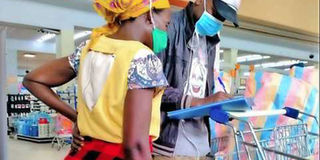‘Adopt a Family’ push giving food and smiles to the needy

A woman living in Kibera looks on as a member of Adopt a Family ticks off her shopping list. Adopt a Family is an initiative to help needy families in Kibera by linking them with helpers. PHOTO | COURTESY
What you need to know:
- Adopt a Family WAS launched last month by several well-off individuals to help the poor in this informal settlement
Mr Moses Omondi, 38, a community mobiliser, is the mind behind this initiative.
When Vivian Okumu, 25, bows down to pray, there is a name of a man that comes to mind. She has not met or talked to him, which makes the man a stranger. To Ms Okumu, however, he is a rescuer and helper.
She is one of the people in Kibera receiving help through an initiative called Adopt a Family, launched last month by several well-off individuals to help the poor in this informal settlement, who are among the thousands of Kenyans that have been left without a source of livelihood since March when the first case of Covid-19 was reported in the country.
“Most of us here barely have anything to eat. There are days we go without food, hoping that the next day will be better,” says Ms Okumu, a hairdresser who was working as a volunteer on sexual reproductive health campaigns before the Covid-19 pandemic that has resulted to slow business and halting of such projects altogether, struck.
She is the breadwinner of a family of six. Her mother, who is sickly, has diabetes and asthma.
Mr Moses Omondi, 38, a community mobiliser, is the mind behind this initiative. “After the call by the government for people to stay at home, promote social distancing and reduce physical contact, I started to receive numerous calls and texts from people that wanted help,” he says.
Born and raised in Kibera, he has been involved in various community projects and partnered with a number of local organisations to run and support various development projects in Kibera. He is therefore known to many here and is familiar with the threads of challenges that knit the lives of the thousands of people living in this slum.
“So far, we have 90 families that we are supporting through the programme,” says Mr Okumu.
They identify and vet needy families in the 13 villages that make up Kibera and then link them with helpers, who give the families at least Sh1,500 every week for their upkeep. The adopter can choose to send the money directly to their adopted family, give them shopping vouchers or foodstuff.
“After launching the programme in partnership with a number of local leaders and volunteers, we went online on various social media platforms — WhatsApp, Facebook and Twitter and asked people to join the cause. We have adopters across Kenya, including some from Kibera, as well as different parts of the world, including Canada and the UK.
Mr Alex Waiganjo is one of the people who have adopted a family in Kibera. He has not met his adoptee and has not been to the slum.
“I saw a tweet requesting people to come out and help the needy families. I thought to myself, I have heard how bad things are from my friends in business.
It must be worse for those who live from hand to mouth. I consider myself lucky that, being in the IT field, I can work conveniently from home, so the pandemic has not hit me as hard as most of my friends. Furthermore, although I have dependants, the responsibilities are not as much because I don’t have a family of my own,” he says.
The IT professional adopted Kelvin Agure’s family of five, and feels obligated to continue supporting them.
“When I started to support the family, I did not give myself a timeframe of how long I would do it. But, as long as I have the means, they are now part of my responsibilities,” he shares.





